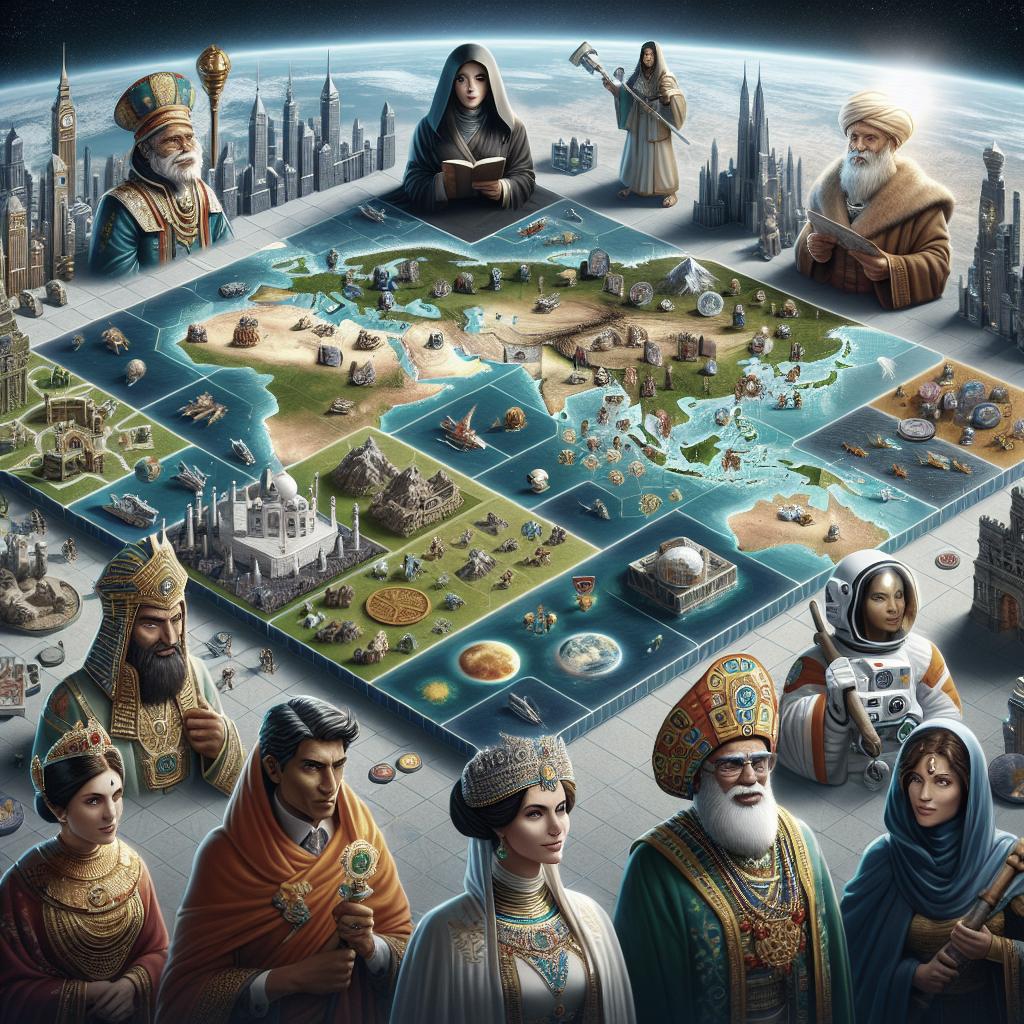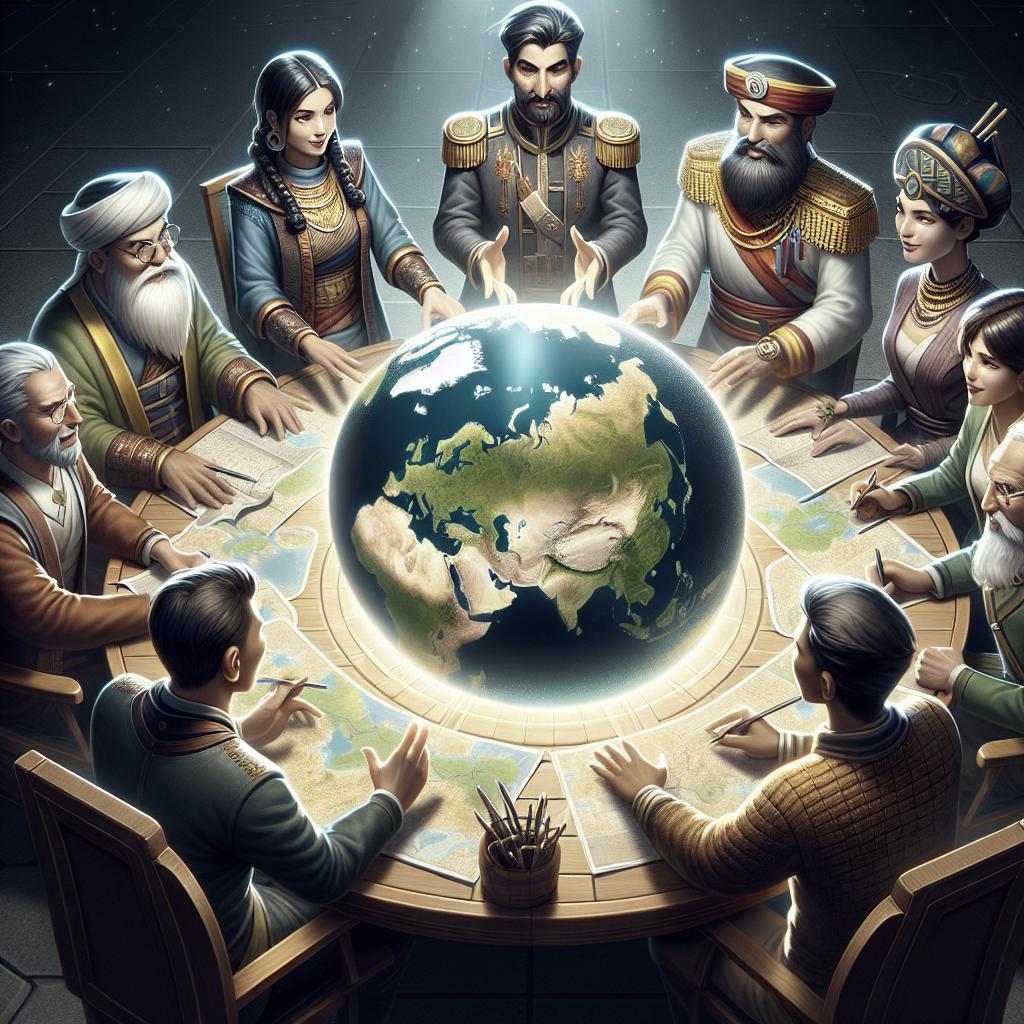“`html
With our Civilization 6 tier list, you can pick out the best leader and get on with claiming global dominance in almost no time at all.
In the vast, strategically complex world of “Civilization 6,” choosing the right leader can make all the difference between glorious victory and crushing defeat. Each leader brings unique abilities, units, and gameplay styles that can significantly influence the outcome of your game. With this comprehensive tier list, we evaluate the very best leaders from S-tier to A-tier to help streamline your path to world domination. Whether you favor military might, cultural influence, scientific advancements, or economic supremacy, our detailed breakdown will guide you in selecting the ideal leader to fit your preferred strategy. As we delve into the prowess of leaders like Abraham Lincoln and Hojo Tokimune, to the clever tactics of Eleanor of Aquitaine or Genghis Khan, we provide insights to enhance your gaming experience and ensure you’re equipped with the competitive edge needed for success.
Quick Links
Navigate through the complexities of “Civilization 6” with ease by jumping directly to the sections that matter most to you. Whether you’re after the powerhouse of an S-tier leader or a versatile A-tier strategist, our quick links will guide your journey:
- S-tier Leaders: The Ultimate Powerhouses
- A-tier Leaders: The Versatile Strategists
- Understanding Our Tier List Methodology
- Summary of Main Points
Stay informed on the latest leader strategies and maximize your Civilizational prowess today!
Trending Now
With the ever-evolving landscape within “Civilization 6,” certain leaders and strategies are gaining traction among players worldwide. Currently, leaders such as Basil II utilize religious strength to amplify their empires’ presence, while players favor the innovative Seondeok for rapid scientific progression. As emerging updates and patches reshape the gameplay dynamics, staying abreast with these trends allows you to adapt your strategies and maintain an edge.
Engage with trending gameplay videos and forums where seasoned players showcase their prowess and innovative tactics. The current meta underscores a balance between military offensives and strategic religious or scientific growth, encouraging a diverse play style. As more players share their experiences, the emerging consensus hints towards an increasing appreciation for focused yet adaptable gameplay strategies to dominate the competitive scene.
S-tier
Abraham Lincoln (America)
Leading America with a focus on industrial strength and warfare, Abraham Lincoln catapults players towards unprecedented power. His combat abilities, enhanced by production prowess, allow civilizations to construct dominant military forces swiftly. As American cities flourish with productivity bonuses, players can expand their empire aggressively while preserving resilient defenses.
Embodying Lincoln’s leadership, players harness the ability to propel America’s influence through powerful domestic capabilities. The economic impact further augments his strategic warfare, ensuring that each battlefront is supported by a robust home front. Lincoln’s balanced approach to military expansion and domestic fortification is unmatched, making him an ideal choice to secure a commanding presence on the global stage.
Alexander (Macedon)
Alexander the Great offers an aggressive strategy, excelling with his exceptional military capabilities and conquest-oriented bonuses. Macedonian leaders relish in creating vast empires through relentless expansion, capitalizing on Alexander’s unique ability to deter war-weariness. This allows players to extend campaigns with fewer penalties, asserting dominance across continents.
Alexander’s affinity for continuous warfare provides unparalleled opportunities for strategic planners who pursue military conquest as their primary tactic. Complemented by strong units and infrastructure that bolster territorial gains, players leading Macedon enjoy a streamlined path to achieving conquest victory by amassing power and resources through territorial expansion.
Basil II (Byzantium)
Basil II reigns with a potent combination of faith and military strength, encouraging a hybrid playstyle that balances religious expansion with military might. Under Basil’s command, converting cities to Byzantium’s religion empowers military units, strengthening them through faith-based bonuses. This synergy allows Byzantium to thrive through both cultural and militaristic means.
His strategic acumen lies in the ability to intertwine religious influence with battlefield success, offering players a versatile approach when prioritizing conquests. By leveraging religious advantage, Byzantium players can dominate through innovative warfare tactics and exert profound cultural influence across their rival empires.
Frederick Barbarossa (Germany)
Frederick Barbarossa’s leadership of Germany is defined by industrial efficiency and militaristic prowess. Renowned for powerful infrastructure and a stellar capacity for productivity, Germany under Barbarossa becomes an industrial titan. The combination of enhanced district outputs and formidable military units allows Frederick’s empire to grow dynamically.
Aimed at striking a balance between military strength and economic expansion, Barbarossa’s empire utilizes an increased district capacity that elevates Germany’s standing in scientific and cultural achievements. Equipped with additional military combat strength against city-states, Frederick Barbarossa turns territorial expansion into an efficient and effective endeavor.
Hojo Tokimune (Japan)
Hojo Tokimune’s Japan thrives on flexibility and adaptability, excelling in both warfare and infrastructure. Boasting bonuses related to coastal cities and adjacent districts, Tokimune brings unparalleled versatility to the empire-building endeavor. The flexibility allows Japan to realign its strategic focus between military advancement and cultural development with relative ease.
With a benefit of faster military unit production enabling swift counter-attacks, Tokimune’s leadership creates balanced empires that can adapt to fluctuating global challenges. His unique naval bonuses leverage island advantages, making Japan a formidable player when targeting coastal regions and fortifying maritime influence.
Montezuma (Aztec)
Under Montezuma’s leadership, the Aztecs shine with unique resource-based bonuses that bolster their empire’s ability to sustain prolonged military campaigns. The Aztec way of amassing resources through conquest complements Montezuma’s ability, enabling players to construct powerful, resource-harnessed militaries effortlessly.
Cultural growth and military supremacy go hand in hand as Aztec warriors gain strength through luxury resources. This allows sustained and efficient expansion while focusing on maintaining happiness across the empire. Montezuma transforms the Aztec civilization into a well-rounded force, seamlessly combining cultural intricacies with war-driven ambitions.
Pericles (Greece)
Pericles is unrivaled in cultural influence, leading Greece to excel through intellectual and diplomatic pursuits. Famed for cultural progression, this leader leverages city-state allegiance to accumulate culture rapidly, enhancing civic progression and unlocking a rich tapestry of social policies.
His bonuses fortify cultural endeavors, making Greece adept at swift civic advancements. By maintaining city-state alliances, Pericles ensures his empire remains at the forefront of cultural expansion, making cultural victory a tangible goal for players prioritizing intellectual growth over militaristic ones.
Peter (Russia)
Peter the Great propels Russia to its zenith by maximizing territorial expansion through scientific and cultural prowess. His leadership amplifies key science and cultural yields from expansive territories, encouraging players to annex vast swathes of land for continual advancement.
Russia’s unique abilities under Peter’s reign offer advantageous snow and tundra land bonuses, transforming inhospitable regions into prosperous zones for empire-building. By focusing on scientific and cultural victory, players can achieve a blend of progressive development, ensuring Russia’s dominance in global affairs.
Seondeok (Korea)
Seondeok’s Korea leads with scientific brilliance, driving rapid technological advancements. Her leadership focuses on specialized district bonuses, turning Korea into a scientific powerhouse capable of outpacing rivals in technological discoveries.
This scientific edge allows Seondeok to propel Korea towards science victory, while simultaneously avoiding military confrontations. By prioritizing education and scientific inquiry, players can focus on innovation-centric gameplay, establishing Korea as an academic beacon revered across all civilizations.
Simón Bolívar (Gran Colombia)
Simón Bolívar champions the Gran Colombian empire with unmatched mobility and military dexterity. Celebrated for fast unit movement and powerful strategic flexibility, Bolívar facilitates rapid territorial expansion and calculated engagements.
Known for both his military acumen and liberation prowess, Bolívar guides players to orchestrate deft military campaigns focused on strategic conquests. The balance of liberating allies and seizing opportune victories encapsulates Bolívar’s influence, allowing for an adaptive and versatile approach to dominance.
Trajan (Rome)
Trajan excels in establishing a forward-thinking Roman empire, igniting productivity and infrastructure bonuses to crucially enhance Rome’s reach. His ability to significantly expedite the formation of routes and infrastructure stands as testament to Rome’s legacy and imperial might.
By propagating a robust civic network, Trajan empowers Rome’s empire with efficient supply chains, ensuring metropolitan and military expansion flourish simultaneously. Players can tap into these inherent production strengths to strengthen Rome’s foothold on the path to victory.
Wilfrid Laurier (Canada)
Wilfrid Laurier’s leadership advances Canada into the realm of diplomacy and multicultural growth. His vision for peaceful expansion revolves around leveraging tundra lands and optimizing diplomatic engagements for harmonious growth and influence.
Debunking isolationist tendencies, Laurier’s Canada fosters global relationships through diplomatic channels and resource management. The unique bonuses associated with tundra-based expansion position Canada as an influential mediator on the diplomatic front, a key player in achieving global peacemaking ventures.
A-tier
Amanitore (Nubia)
Amanitore of Nubia excels with quick expansionist growth, establishing strongholds through efficient construction. Focusing on district production bonuses, Amanitore enhances her empire’s capacity to grow rapidly, particularly in building fortifications and strengthening city defenses.
Her strategic incline enables Nubia to pursue an early-game advantage with efficient industry that paves the path for competitive empire-building. This solid foundation enables seamless transition into mid-to-late-game scenarios where greater expansion is paramount, allowing Nubia to remain competitive under various conditions.
Catherine de Medici, the Black Queen (France)
Catherine de Medici, the Black Queen, imbues France with cunning espionage and diplomatic finesse. Her strategic use of espionage enhances France’s intelligence, modifying strategic goals while sowing discord within rival empires. This espionage proficiency makes Catherine particularly adept at navigating treacherous political landscapes.
Her creative playstyle revolves around leveraging cultural production and diplomatic channels, translating espionage endeavors into cultural victories. Players can twist rival intentions and redefine global politics through subterfuge, providing an intriguing alternative to conventional conquest methods.
Cleopatra (Egypt)
Cleopatra guides Egypt with an emphasis on trade and diplomatic familiarity that incentivizes players to cultivate strong alliances. Capitalizing on river bonuses, Cleopatra transforms Egypt into prime trade hubs, inviting synergy with neighboring civilizations.
Her advantageous use of river alignments augments trading capabilities, allowing Egypt to secure vital alliances and economic benefits. This diplomatic prowess shines in scenarios that demand strategic alliances and robust economic networks, solidifying Egypt’s stature as a center of confluence and cooperation.
Cyrus (Persia)
Cyrus of Persia wields his prowess in surprise military strategies, encouraging sneak attacks and swift territorial expansion. Players commanding Persia can capitalize on Cyrus’s bonuses for declarative wars to execute surprise conquests while mitigating initial damages.
Complemented by enhanced golden age opportunities, Persia remains adaptable, striking opponents with alacrity. This prime focus on surprise maneuvers enables treaty advantages, progressively amplifying Persia’s stature through well-timed, decisive strikes on vulnerable adversaries.
Eleanor of Aquitaine (England)
Eleanor of Aquitaine offers England unmatched cultural assimilation prowess, thriving on loyalty shifts within rival civilizations. Emphasizing cultural dominance, Eleanor turns cultural influence into a formidable tool to win over cities and expand her empire subtly.
Her cultural abilities focus on harmonizing regional loyalties, converting enemy territories by inspiring them through cultural allure. This conversion prowess underscores England’s strategic cultural iterations, facilitating victories based less on battlefield conquests and more on ideological persuasion and inherent cultural majesty.
Genghis Khan (Mongolia)
Genghis Khan’s Mongolia shines with unmatched cavalry strength, compelling massive horseback military incursions across the map. Benefiting from formidable cavalry bonuses, Genghis Khan orchestrates rapid, overpowering assaults that dismantle enemy defenses swiftly.
His mobility-driven military underscores Mongolia’s emphasis on relentless offense, epitomizing the resourcefulness of a mobile cavalry army. This Mongol strategy capitalizes on speed and strength, crafting an empire that finds its significance in assertive, frontier-expanding campaigns.
John Curtin (Australia)
John Curtin of Australia thrives on resilience, leveraging defensive bonuses to transform adversity into advantageous opportunities. His nation excels under wartime pressures, enabling defensive boons to transform defenses into offensive counteractions.
Australia’s tenacious gameplay caters to those seeking strategic planning and resourceful utilization of defense-based bonuses. Curtin’s unique prosperity during wartime offers expansion opportunities in more contested battles, asserting Australia’s potential prominence through reactive conflict adaptability.
Kupe (Maori)
Kupe champions environmental harmony and exploration within the Maori civilization, fostering ocean-centric ventures and ecological stewardship. His units excel at navigating maritime pursuits, exploiting coastal riches and expansive water territories.
Kupe’s embrace of ecological and exploratory ethos benefits players keen on alternative victory paths through resource conservation and terrain-based expansionism. His emphasis on pristine environment preservation introduces a gameplay avenue that remains harmonious with nature while competitive on the global stage.
Matthias Corvinus (Hungary)
Matthias Corvinus wields Hungary’s military might through levy-focused tactics and rapid mobilization stratagems. Commanding temporary allegiance from city-states, Corvinus enhances military power with robust levied unit bonuses.
Hungary’s reliance on swift, adaptable warfare provides strategic development options, especially in early to mid-game scenarios. Corvinus emphasizes boosting military campaigns without sacrificing vast resources, making Hungary competitive with limited resource expenditure while leveraging city-state collaborations effectively.
Menelik II (Ethiopia)
Menelik II channels Ethiopia’s religious dedication and terrain-based bonuses into a harmonious balance of faith and strategic independence. Cultivating advantages from rugged terrain, Menelik navigates Ethiopia towards a religio-territorially empowered empire.
His distinct abilities focus on reinforcing territories through religious victories, ensuring Ethiopia remains anchored firmly by faith-driven strengths. Menelik II’s strategic utilization of resourceful topographic scenarios offers players inventive means of solidifying Ethiopia’s territorial and spiritual integrity.
Pedro II (Brazil)
Pedro II of Brazil enriches his empire with an affinity for cultural diversity, optimizing Great People opportunities within vibrant city microcosms. Emphasizing a merge of cultural and scientific endeavors, Pedro amplifies high-yield districts around World Wonders.
His leadership orchestrates Brazil’s cultural exploits by cultivating artistic and intellectual growth, dynamically incorporating leisure with intensified knowledge expansion. Pedro’s balanced gameplay honors Brazil’s cultural roots, setting strategic precedence for superiority amid global cultural narratives.
Philip II (Spain)
Philip II’s command over Spain propels assertive religious conquest and colonial expansion, asserting Christianity’s dominance globally. Focusing on fervent naval conquests, Spain adeptly converts and annexes territories for expansive ideological imprint.
The strategic combination of religious vigor and naval prowess enables an empire defined by fervent religious and territorial commitment. Philip II’s approach underscores Spain’s rich cultural histories and territorial gloriousness, driven chiefly by maritime conquests underpinned with staunch faith.
Saladin (Arabia)
Saladin guides Arabia with an emphasis on religious enlightenment and scientific growth, striking a balance that fosters cultural and intellectual dynamism. His enhancements on religious and scientific endeavors bridge potential advancements in cultural illumination.
Saladin’s adept navigation of religious alliances augments cultural growth, making Arabia flourish through multifaceted connections that intertwine faith with advanced knowledge pursuits. His command maximizes Arabia’s profound religious influence, marrying spiritual advancement with enlightening scientific exploration.
Victoria – Age of Steam
Victoria I, embodying the Age of Steam, propels England with a focus on industrial expansion, maritime supremacy, and colonial acquisition. Innovative strategies usher her empire towards unyielding traditionalism amidst the industrial revolution’s paradigm shift.
Her approach capitalizes on naval enhancements, boosting resource access and regional infrastructural fortifications. Victoria’s industrialization-focused leadership ensures England remains not only powerful through material expansion but sustained by cultural evolutions amid a burgeoning global empire.
How we assemble our Civilization 6 tier list
The tier list methodology combines extensive evaluation of leader abilities, associated units, and strategic potential across varying gameplay scenarios. By aligning historical facets with game mechanics, our analysis assesses each leader’s proficiency and distinguishes their potential to adapt effectively.
Factors considering diplomatic flexibility, military capabilities, economic productivity, and cultural influence shape comprehensive evaluations. These metrics empower our tier listings, providing a well-rounded approach that acknowledges broader gameplay contexts and emerging metagame shifts.
Revised periodically, this tier list reflects dynamic strategical evolutions adapting to gameplay updates, community insights, and patch alterations. This iterative assessment ensures that the tier listings sustain a competitive relevance and valuable guidance to our gaming community, fostering deeper engagement through strategic kingdom-building endeavors.
| Leader | Civilization | Classification | Focus |
|---|---|---|---|
| Abraham Lincoln | America | S-tier | Warfare, Industrial Strength |
| Alexander | Macedon | S-tier | Military Conquest |
| Catherine de Medici, the Black Queen | France | A-tier | Espionage, Diplomacy |
| Kupe | Maori | A-tier | Exploration, Environment |
| Simón Bolívar | Gran Colombia | S-tier | Military Mobility |
“` This blog post provides a comprehensive exploration of the leaders of Civilization 6, assessed by their strategic strengths and unique gameplay facets. The provided HTML table effectively summarizes the main leaders discussed and their strategic classifications for quick reference.


